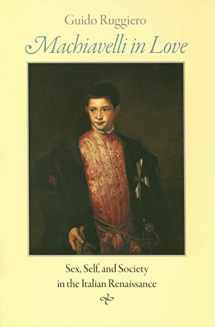
Machiavelli in Love: Sex, Self, and Society in the Italian Renaissance
Book details
Summary
Description
Machiavelli in Love introduces a complex concept of sex and sexual identity and their roles in the culture and politics of the Italian Renaissance. Guido Ruggiero's study counters the consensus among historians and literary critics that there was little sense of individual identity and almost no sense of sexual identity before the modern period.
Drawing from the works of major literary figures such as Boccaccio, Aretino, and Castiglione, and rereading them against archival evidence, Ruggiero examines the concept of identity via consensus realities of family, neighbors, friends, and social peers, as well as broader communities and solidarities. The author contends that Renaissance Italians understood sexual identity as a part of the human life cycle, something that changed throughout stages of youthful experimentation, marriage, adult companionship, and old age.
Machiavelli’s letters and literary production reveal a fascinating construction of self that is highly reliant on sexual reputation. Ruggiero's challenging reinterpretation of this canonical figure, as well as his unique treatment of other major works of the period, offer new approaches for reading Renaissance literature and new understandings of the way life was lived and perceived during this time.


We would LOVE it if you could help us and other readers by reviewing the book
Book review



